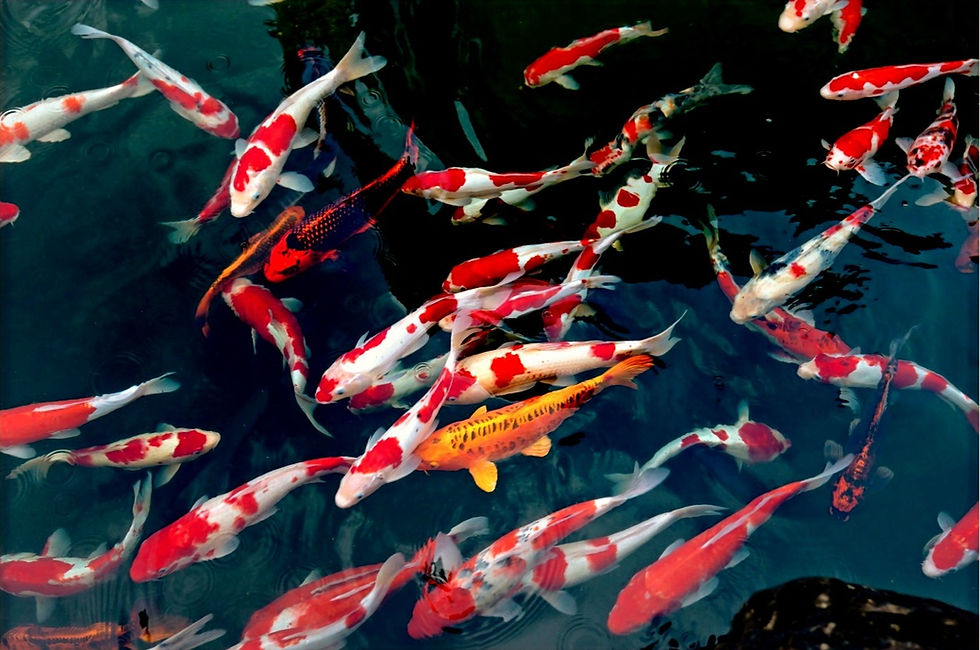Winterizing your pond!
- KoiHappy

- Dec 22, 2022
- 3 min read
It’s that time of year again! The air is crisp and the fish are stocking up on cozy sweaters. But don't worry, it's still early enough to take care of your pond before the temperature drops too low. We've got tips for winterizing your pond and ensuring that it maintains optimal health long into spring.

Fish
When water temperatures drop below 60F, fish’s metabolism and digestion slow down. This is the time to switch their food to one containing less protein and feed them less often. The fish will begin hibernating at around 50F so it’s then time to stop feeding them all together!
It is helpful to have a pond thermometer so you’re able to check the water temperatures, they will be different to the air temperatures. How often you feed your fish will depend on how cold their water is.
Check your fish for signs of sickness or disease so you’re able to treat them before closure!
Plants
Some plants will be happy to stay outside during winter, and others won’t. It’s important to know which of your plants are in which group so you’re able to give them all the best chance of survival!
For your ‘happy outside in the cold' plants, you will need to cut them back and trim off dead leaves and unhealthy foliage. If you’re able, move the plants to a lower level of the pond where it will be a few degrees warmer during winter.
Plants that are unhappy in the cold will need to be brought indoors, depending on the variety, these can be treated as houseplants! Equally, you can compost cheaper plants like floating lettuce and water hyacinth since they are easy to replace in the spring and it’ll save you space storing them in your home!
Remove, Clean and Store
If you live in a climate that experiences freezing temperatures during winter, you’ll need to disconnect and remove your pump, filters and UV lights so they don’t freeze and break. Your fish will be fine without a pump in these temperatures because they’ll be hibernating at the bottom of the pond where the water is warmer.
Aside from freezing up, keeping a pump going would cause the water to mix up and create an equal temperature throughout, which will ultimately be colder for the fish and could cause adverse effects. This is a good time to remind you to turn off your waterfalls! they will have the same effect.
Once you’ve removed the filter, pump and UV lights, give them a thorough clean and put them into dry storage.
Clean Your Pond
Give your pond a good clean before closing it up for winter to lower the chances of coming back to any nasties in the spring! Leaves and organic debris need to be removed to avoid the risk of any spikes in ammonia and/or nitrates during the hibernation period.
Don’t forget to clean out the skimmer basket and drain plumbing lines!
What to Instal…
Installing an aeration pump is a must for ponds during winter. It will keep the surface water agitated which is not only good for maintaining oxygen levels but it helps to stop your pond from freezing over.
Depending on the climate in which you live, and if you are preempting extremely cold temperatures, you may want to opt for a de-icer. It keeps a hole in the ice surface that will form on the top of your pond, which will allow bad gasses to exit and oxygen to enter. Pairing a de-icer with the aeration pump is your best bet for keeping your fish safe; fish are more likely to die in winter because they suffocate, not because they freeze.
Covering your pond with netting is the best way to prevent leaves and other debris from falling in and decaying over the winter. Simple, but effective! If leaves are left to fall in they will decay over the hibernation period which will cause spikes in ammonia and nitrate, resulting in disruption to the water quality.
One last thing…
Evict the frogs! Once you’ve covered your pond with netting, they won’t be able to get out. Frogs need to hibernate in mud, not your pond liner! Rotting frogs aren’t what you want to find in the spring, not to mention being toxic to your fish.
All this being said, you can always hire a local expert to come and take care of winterising your pond! Either way, make sure to set your pond up to thrive during the winter months!





Comments